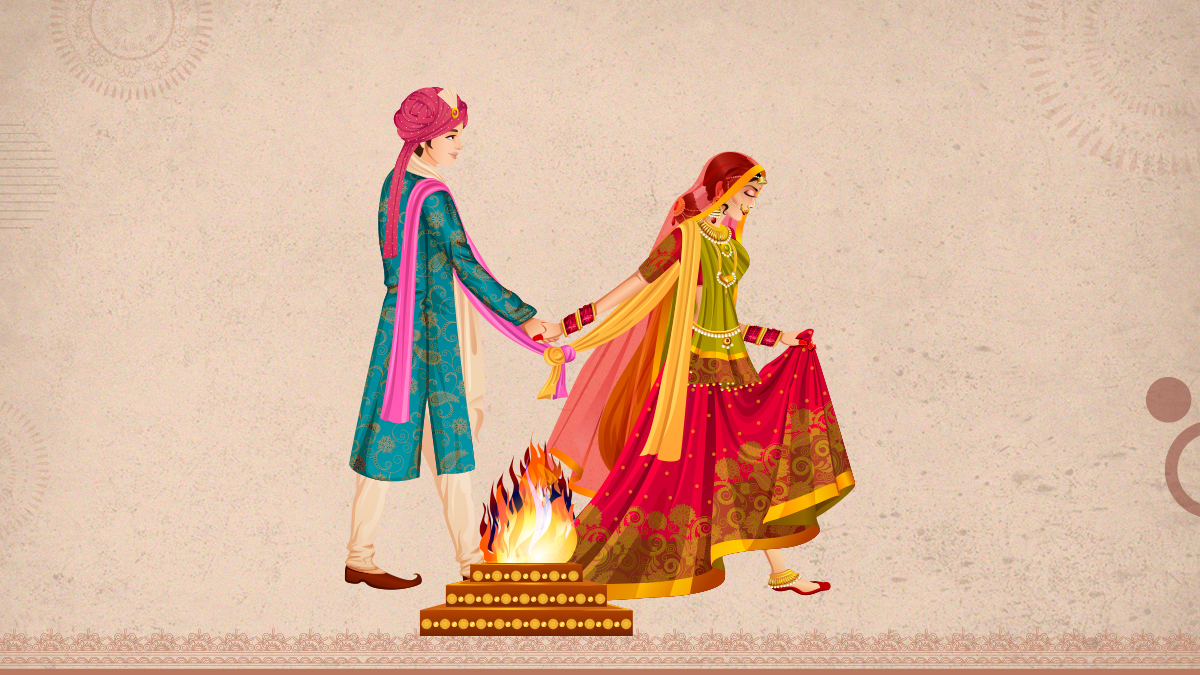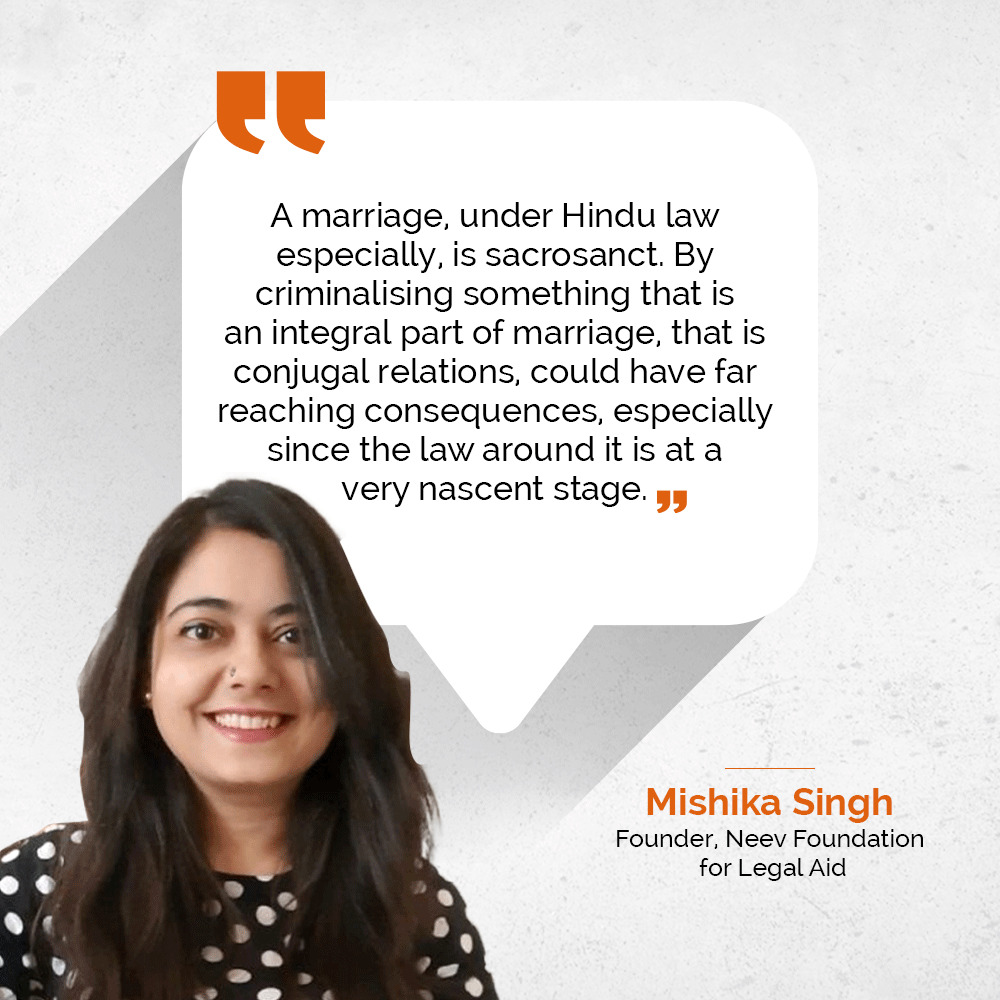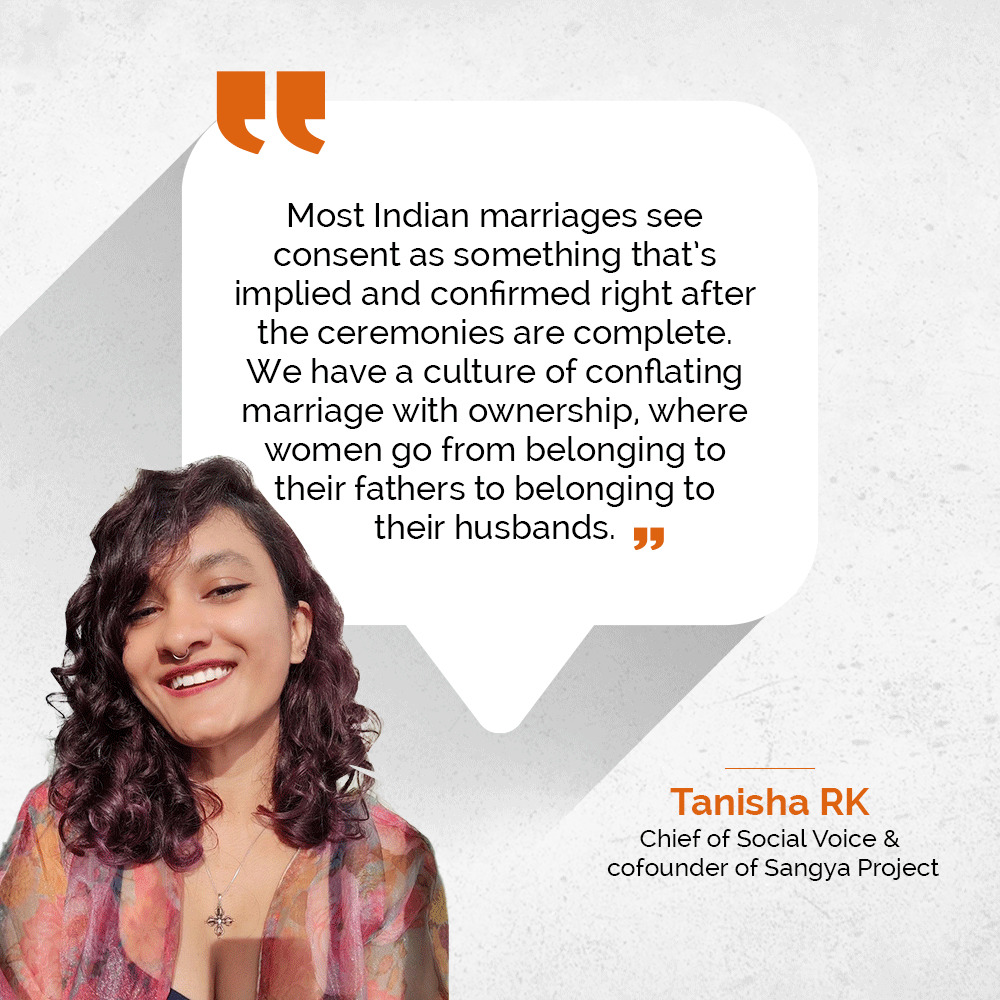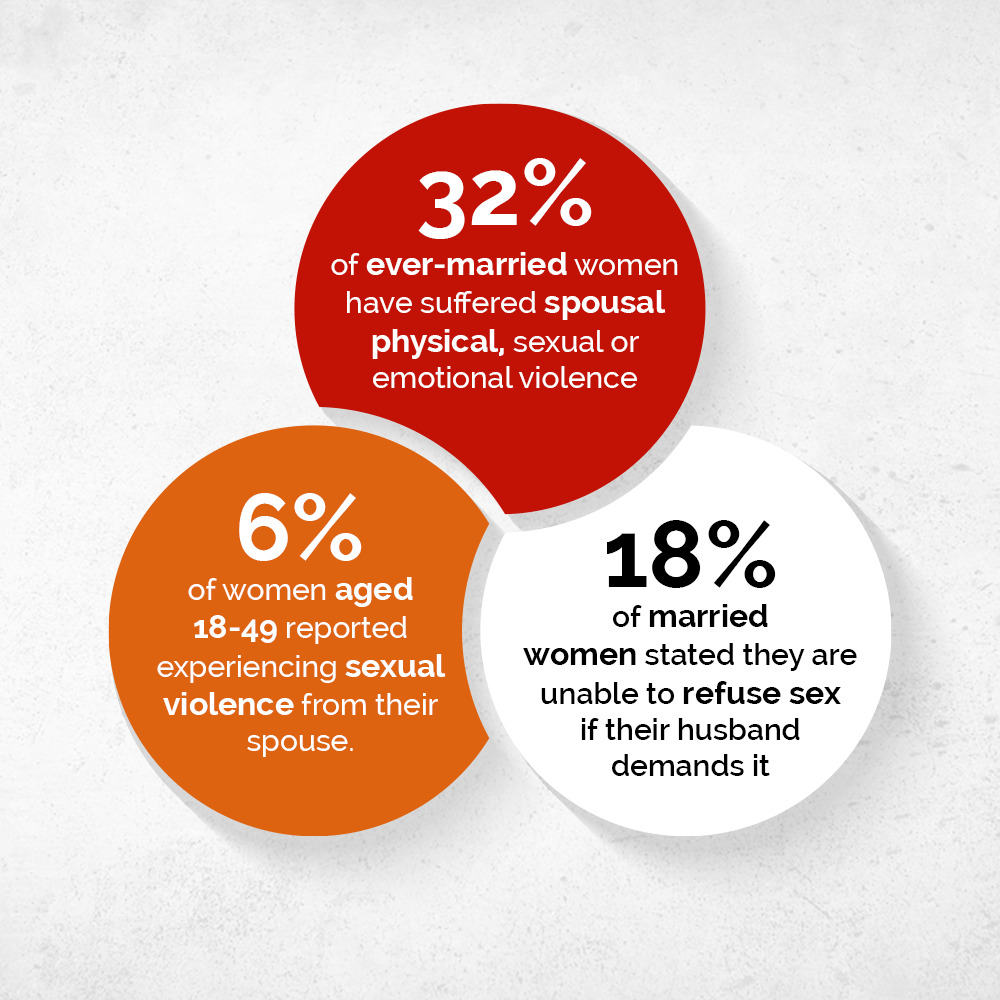
In early October, the central government urged the Supreme Court not to criminalise marital rape, arguing that doing so could have ‘ long-term effects on the institution of marriage.’ This statement reignited debate on the long-standing, contentious issue.
Presently, exception two to Section 375 (the section that defines the offence of rape) mentions sexual intercourse between spouses isn't rape, except in the case if the wife is less than 15 years. Bharatiya Nyaya Sanhita (BNS) follows this ruling too.
The underlying debate rests on whether marriage grants men the right to have sexual expectations and implies ongoing consent by women. Those arguing against criminalising it say it is difficult to prove such matters within institutions socially held as sacrosanct. Those seeking the exception being struck down in Section 375 say that it violates a woman’s right to equality, the right to life with dignity, and the right to self-expression.
“This back and forth over details that help us define rape and distinguish it from consensual acts is a perfect illustration of how nuanced the conversations around consent, safety and women’s autonomy need to be on not just a personal level, but also at a judicial one,” said Tanisha RK, Chief of Social Voice and cofounder of Sangya Project. Tanisha has worked extensively as a sex educator as well.
While the data points to the need for taking the issue of marital rape seriously, experts felt that the recent comment demonstrates how we are still a long way from recognising that bodily autonomy cannot be stripped from someone under the guise of marriage.
HerZindagi tries to decode why marital rape has been a controversial topic for years, the legal precedents surrounding such cases, and the complexities of consent within marriages in India.
“The understanding and judicial interpretation of the concept of ‘consent’ differs in a marital relationship compared to any other relationship outside marriage,” the government stated.
It claimed that within marriage, there is a continuing expectation from the spouses for reasonable sexual access to each other. However, this does not allow a man to force himself on his wife without her consent, added the statement.
The government further argued that the obligations and expectations within marriage, which do not exist with a stranger or even in other intimate relationships, provide a sufficient basis for the legislature to treat non-consensual sex within marriage differently from the others.
The government argued that married women are already protected from sexual offences through existing legal remedies, suggesting that imposing stricter penalties for marital rape could be ‘excessively harsh’. The bench, led by Chief Justice of India DY Chandrachud and including Justices JB Pardiwala and Manoj Misra, was informed that the issue requires a comprehensive approach rather than a strict legal approach to avoid significant socio-legal consequences in a marriage-centric society like India.
The centre’s stand is rooted in our idea of marriage as a society, and what we feel about a married couple and their duties towards each other, explained Mishika Singh, Founder - Neev Foundation for Legal Aid and Matrimonial lawyer.
“A marriage, under the Hindu Marriage Act especially, is sacrosanct. Criminalising something that is an integral part of marriage in conjugal relations, could have long-term consequences, especially since the law around it is at a very nascent stage,” she said.
The other problem raised is the fear of it being abused. “I think lawmakers need to take that aspect into consideration and look into how it can be probed and proven,” she added.
The law has been so contentious and debated due to the concern surrounding how difficult it may be to prove violations in such cases, where the two people involved are engaging or have engaged in consensual conjugal activities otherwise.
According to Tanisha, co-founder of Sangya Project and a sex educator, the issue of consent within Indian marriages is deeply entwined with cultural norms and power dynamics that have persisted for generations. "Most Indian marriages see consent as something that’s implied and confirmed right after the ceremonies are complete," she explained, highlighting the long-standing practice of treating marriage as ownership. "We have a culture of conflating marriage with ownership, where women go from belonging to their fathers to belonging to their husbands," she added.
This dynamic, Tanisha argued, feeds into the way sex is viewed in India. "Sex, in India, is still typically seen as something men need and deserve as an outlet or a release, while women must be silent and passive providers of that sexual release for men."
This entrenched perspective leaves little room for a healthy understanding of consent and autonomy within marriage.
Tanisha stressed that it’s unrealistic to expect equitable relationships or clear definitions of consent to emerge from a system that objectifies and silences women. "You cannot place power in the hands of one party through structural, legal, and financial provisions over generations, then expect equity and healthy dialogue between two married partners," she highlighted.
"Indians being unable to define marital rape with clarity is a testament to just how many generations of this country have firmly believed that a married woman must provide her body to the man she married,” she added.
For real change to happen, Tanisha argued, it is essential to overhaul the culture people are exposed to before they even enter marriage. "We need our women not to be stuck in situations where they must abide by the arbitrary rules of their husbands simply to access financial stability, keep a roof over their heads, keep their children safe, and escape the vitriol and violence that comes with being an autonomous woman in this country."
Read: A Decade After Nirbhaya: Unraveling India's Enduring Rape Culture
Tanisha believes that without a cultural shift toward equality and mutual respect, the ongoing debates about marital rape and safety within marriages will remain meaningless. "This idea of preserving the ‘institution of marriage’ above all else is inhumane," she concludes.
According to the government's National Family Health Survey conducted between 2019-2021, said that 32% of married women have suffered spousal physical, sexual, or emotional violence.
6% of women aged 18-49 reported experiencing sexual violence from their spouse. Additionally, around 18% of married women stated they are unable to refuse sex if their husband demands it.
4% reported that their husband forced them with threats or other means to engage in unwanted sexual acts, while 2%t reported being forced by their husband to perform sexual acts against their will.
Additionally, there exists a reluctance among women to seek help. A study that collated data from the NFHS survey found that only around 14% of those who faced intimate partner violence, ever sought any help.
Mishika works in matrimonial cases mostly and says that marital rape is a grave reality, across social strata. “There is a lot of shame surrounding it. Women in such marriages are often unable to communicate about it, sometimes they’re unable to articulate it properly. Therapy is not a common practice, so often lawyers become the first point where they open up,” she said. “A woman being violated unfortunately has no recourse, until she wants to take it up legally under the domestic violence act. We need to find ways to accommodate this violence happening against women because it is a reality.”
Previous court rulings on marital rape have yielded mixed outcomes.
In 2018, while hearing a case involving a man accused of rape and domestic violence by his wife, the Gujarat High Court stated that “Marital rape should be a crime, not just a concept."
In 2019, the Delhi High Court directed the government to consider amending the existing laws to make marital rape a criminal offence.
On the other hand, contradicting judgements have also been passed. In 2021, the Chhattisgarh High Court ruled that any sexual act husband is not classified as rape, even if it is carried out against the woman's consent or under coercion.
Read: Legal Gaps and Lack of Support: Why Queer Sexual Harassment Remains Overlooked
Another commonly heard reason on social media and other discourses against criminalising marital rape is that women may misuse it.
Experts pointed out that such reasoning serves little purpose.
Mishika points out that laws get abused, and it's not a gendered thing. “There is no way to say which law will get abused more and by whom. Since I’ve been in this field for the last ten years, I would like to point out that it is not easy to abuse the law. It is difficult even today for FIRs to get registered under Section 498A (deals with cruelty against a woman by her husband or his relatives) and then reach the court. I disagree with the theory that a law shouldn’t be introduced due to fears of being misused,” she said.
She highlighted laws like POSH where punishments are codified around complaints registered with malicious intent. “I think there’s a reluctance to accept that this is a crime, and it is happening within marriages in India,” she added.
Tanisha on the other hand questioned, “Why does our instinct always anticipate that women will misuse the law and choose deception, but not to address the blatant misuse of the institution of marriage by several men?”
“We cannot update and reshape the law if we notice a problem – in this case, frequent male-driven violence against women, and then focus on debates about how any changes to the law must first shield men from possibly being held unfairly accountable,” she added.
Tanisha also highlighted that the problem here has already been that the laws around marriage, as they stand today, do allow men to exercise ownership over the women of the household which frequently leads to physical, sexual, psychological, financial and social harm. “Do we want to fix that problem or not,” she said.
Also watch this video
Herzindagi video
Our aim is to provide accurate, safe and expert verified information through our articles and social media handles. The remedies, advice and tips mentioned here are for general information only. Please consult your expert before trying any kind of health, beauty, life hacks or astrology related tips. For any feedback or complaint, contact us at [email protected].